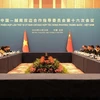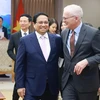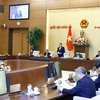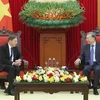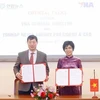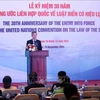Realities show that the “ doi moi ” (renovation process) would not have come about in the absence of the Communist Party of Vietnam (CPV), whose sound leadership has successfully carried out the process.
Introduced at the sixth National Party Congress in December 1986, the renovation process was a revolutionary choice for national development, targeting economic growth as a significant turning point in the history of Vietnamese revolution.
By looking at, correctly evaluating and identifying the realities, the Congress laid out comprehensive national reform policies focused on changing the entrepreneurial mindset.
The move was a key breakthrough in the Party’s ideology, opening the door to improvements in every aspect of society by unleashing production force and shifting from the centrally-oriented economy to a socialist-oriented market economy.
Prior to the renovation process, Vietnam had long maintained a non-market economy, which, to some extent, helped mobilise human and material resources for the liberation war, but was flawed and limited the country’s forward progress.
The reality raised the need for the country to undertake cross-sector reform addressing structure and regulations for developing a socialist-oriented market economy and designing new approaches to organisational apparatus and leadership. In the face of increasing opportunities and challenges, renovation is an unavoidable priority to set the stage for innovation and increased production, buoying socio-economic progress.
Looking back the past nearly 30 years of renovation under the Party leadership, Vietnam has achieved a great deal of substantial successes across the board.
During the initial renovation period of 1986-1990, the average growth of gross domestic product (GDP) was a mere 4.4 percent, which soared to 7.6 percent from 1991-2000 and 7.34 percent from 2001-2005. Due to the global economic slump, the Vietnamese economy slowed down to a 6.32 percent average from 2006-2010.
Suffering from the repercussions of the 2008 global financial crisis and 2010 public debt crisis, the economy has contracted over subsequent years, recording an average growth of only 5.6 percent between 2011 and 2013 and 5.98 percent in 2014.
Notably, the growing GDP per capita has pulled Vietnam out from the categorisation of “underdeveloped” to become a middle-income economy.
To create a legal corridor for a socialist-oriented market economy, all necessary regulations have been devised in tandem with the Party’s renovation policies and crafted into laws.
The promulgation of the 1992 Constitution in replace of the 1980 predecessor has established a solid legal framework for the shift from a central economy to a multi-sector commodity market economy with socialist orientations under State management.
Notably, the 2013 Constitution has substantial improvements from the 1992 edition, such as the rights to free trade in each legitimate sector and better reflecting the nature of the socialist-oriented market economy.
The process of renovation and fostering socialism has provided the country and its people with material and spiritual comforts. Vietnam fulfilled many of the United Nations millennial development goals in 2008, seven years ahead of the 2015 deadline.
Vietnam has sufficient evidence to affirm that renovation is a strong choice, stimulating a new cycle of quality growth in line with modern trends and public aspirations.
After nearly 30 years of relentless efforts, the renovation process initiated and led by the Party shows signs of being both effective and beneficial, paving the way for substantial and historic triumphs. The country has made significant achievements in its rapidly growing market economy and improving quality of life. The political system and national unity sentiment continue to grow stronger, maintaining national security and defence and elevating Vietnam ’s status in the global arena.-VNA
Introduced at the sixth National Party Congress in December 1986, the renovation process was a revolutionary choice for national development, targeting economic growth as a significant turning point in the history of Vietnamese revolution.
By looking at, correctly evaluating and identifying the realities, the Congress laid out comprehensive national reform policies focused on changing the entrepreneurial mindset.
The move was a key breakthrough in the Party’s ideology, opening the door to improvements in every aspect of society by unleashing production force and shifting from the centrally-oriented economy to a socialist-oriented market economy.
Prior to the renovation process, Vietnam had long maintained a non-market economy, which, to some extent, helped mobilise human and material resources for the liberation war, but was flawed and limited the country’s forward progress.
The reality raised the need for the country to undertake cross-sector reform addressing structure and regulations for developing a socialist-oriented market economy and designing new approaches to organisational apparatus and leadership. In the face of increasing opportunities and challenges, renovation is an unavoidable priority to set the stage for innovation and increased production, buoying socio-economic progress.
Looking back the past nearly 30 years of renovation under the Party leadership, Vietnam has achieved a great deal of substantial successes across the board.
During the initial renovation period of 1986-1990, the average growth of gross domestic product (GDP) was a mere 4.4 percent, which soared to 7.6 percent from 1991-2000 and 7.34 percent from 2001-2005. Due to the global economic slump, the Vietnamese economy slowed down to a 6.32 percent average from 2006-2010.
Suffering from the repercussions of the 2008 global financial crisis and 2010 public debt crisis, the economy has contracted over subsequent years, recording an average growth of only 5.6 percent between 2011 and 2013 and 5.98 percent in 2014.
Notably, the growing GDP per capita has pulled Vietnam out from the categorisation of “underdeveloped” to become a middle-income economy.
To create a legal corridor for a socialist-oriented market economy, all necessary regulations have been devised in tandem with the Party’s renovation policies and crafted into laws.
The promulgation of the 1992 Constitution in replace of the 1980 predecessor has established a solid legal framework for the shift from a central economy to a multi-sector commodity market economy with socialist orientations under State management.
Notably, the 2013 Constitution has substantial improvements from the 1992 edition, such as the rights to free trade in each legitimate sector and better reflecting the nature of the socialist-oriented market economy.
The process of renovation and fostering socialism has provided the country and its people with material and spiritual comforts. Vietnam fulfilled many of the United Nations millennial development goals in 2008, seven years ahead of the 2015 deadline.
Vietnam has sufficient evidence to affirm that renovation is a strong choice, stimulating a new cycle of quality growth in line with modern trends and public aspirations.
After nearly 30 years of relentless efforts, the renovation process initiated and led by the Party shows signs of being both effective and beneficial, paving the way for substantial and historic triumphs. The country has made significant achievements in its rapidly growing market economy and improving quality of life. The political system and national unity sentiment continue to grow stronger, maintaining national security and defence and elevating Vietnam ’s status in the global arena.-VNA











